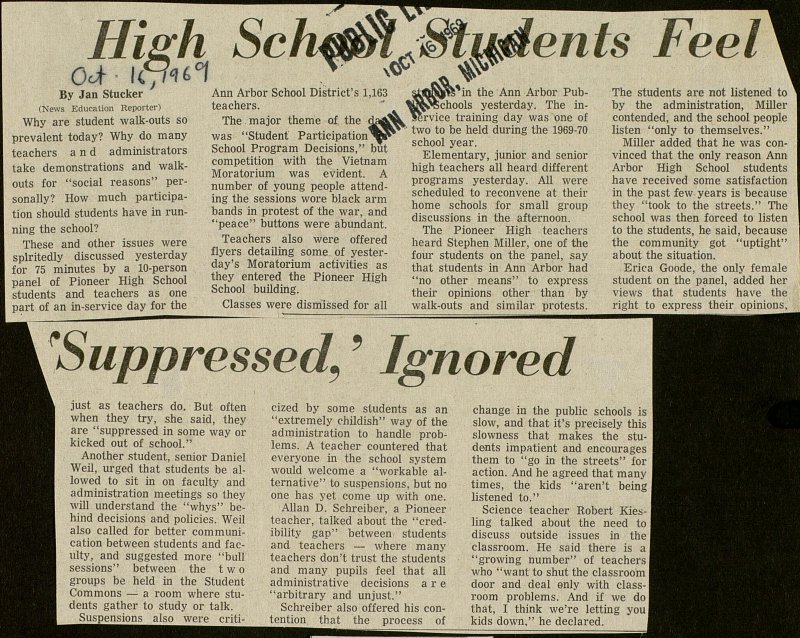High School Students Feel 'Suppressed,' Ignored

Why are student walk-outs so prevalent today? Why do many teachers and administrators take demonstrations and walkouts for "social reasons" personally? How much participation should students have in running the school? These and other issues were splritedly discussed yesterday for 75 minutes by a 10-person panel of Pioneer High School students and teachers as one part of an in-service day for the Ann Arbor School District's 1,163 teachers. The major theme of the daaS was "Student Participation School Program Decisions," but competition with the Vietnam Moratorium was evident. A number of young people attending the sessions wore black arm bands in protest of the war, and "peace" buttons were abundant. Teachers also were offered flyers detailing some of yesterday's Moratorium activities as they entered the Pioneer High School building. Classes were dismissed for all srtmjts'in the Arm Arbor PubLSchools yesterday. The inlervice training day was one of ■■ two to be held during the 1969-70 school year. Elementary, junior and senior high teachers all heard different programs yesterday. All were scheduled to reconvene at their home schools for small group discussions in the afternoon. The Pioneer High teachers heard Stephen Miller, one of the four students on the panel, say that students in Ann Arbor had "no other means" to express their opinions other than by walk-outs and similar protests. 1 The students are not listened to by the administration, Miller contended, and the school people listen "only to themselves." Miller added that he was convinced that the only reason Ann Arbor High School students have received some satisfaction in the past few years is because they "took to the streets." The school was then forced to listen to the students, he said, because the community got "uptight" about the situation. Erica Goode, the only female student on the panel, added her views that students have the right to express their opinions, just as teachers do. But often when they try, she said, they are "suppressed in some way or kicked out of school." Another student, senior Daniel Weil, urged that students be allowed to sit in on faculty and administration meetings so they will understand the "whys" behind decisions and policies. Weil also called for better communication between students and faculty, and suggested more "buil sessions" between the t w o groups be held in the Student Commons - a room where students gather to study or talk. I Suspensions also were cized by some students as an "extremely childish" way of the administration to handle problems. A teacher countered that everyone in the school system would welcome a "workable alternative" to suspensions, but no one has yet come up with one. Alian D. Schreiber, a Pioneer teacher, talked about the "eredibility gap" between students and teachers - where many teachers don't trust the students and many pupils feel that all administrative decisions are "arbitrary and unjust." Schreiber also offered his contention that the process of change in the public schools is slow, and that it's precisely this slowness that makes the students impatient and encourages them to "go in the streets" for action. And he agreed that many times, the kids "aren't being listened to." j Science teacher Robert Kiesling talked about the need to I discuss outside issues in the I classroom. He said there is a I "growing number" of teachers! who "want to shut the classroom I door and deal enly with class-l room problems. And if we dol that, I think we're letting youl kids down," he declared. I
Article
Subjects
Ann Arbor News
Old News